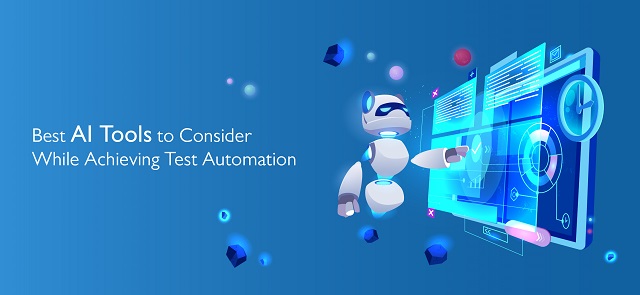The rise of Artificial intelligence has helped organizations in many ways, including streamlining processes, vulnerability detection, and in many other ways. As it provides such advantages to adopters, its popularity is increasing at a high pace. Plus, using AI for test automation is one of the most adopted applications in the quality assurance field.
According to the recent survey of Capgemini, in just one year, 21% of IT experts have adopted AI to shift their traditional testing strategies to automation. Plus, only 2% stick to their current technology architecture and have no further plans to move to AI for at least 3-5 years.
After seeing such an inclination of businesses towards AI, we can guess its impact on test automation in upcoming years. Today, product quality and customer experience play a vital role in the success of any company. Therefore, they must leverage better software quality testing strategies before rolling out the application to the market.
AI contains many use cases for the domain of software testing, so let’s have a look.
Importance of AI in Software Testing:
AI-enabled test automation framework can provide many benefits to the quality assurance engineers, like faster product time-to-market and smooth transition through automation. Neural networks and machine learning abilities are the foundation of AI, which are being used in many automated software testing modules.
When organizations use AI or its subtypes individually, they can get assistance in the software testing in a given way to:
- Get meaningful insights while the system is under testing process
- List all possible outcomes of testing processes with potential drawbacks and associated activities
AI-based software testing modules operate in two steps – at first, it trains the system, then implements the test processes accordingly. Today’s AI-enabled software products can also be seen as observers because they learn new things from old datasets and drive better decisions by analyzing both good and bad experiences. To implement new capabilities, they need human feedback to ensure whether they are performing the right actions or not.
Read More: Latest Software Testing Trends in 2022
AI-enabled testing software results as the best QA tools that contain compelling attributes, which let developers:
- Implement automation framework
- Design code libraries that can generate lots of code-lines in a minute
- Create new object repos
- Streamline UI verification scripts and make them adapt changes automatically
- Incorporates CI/CD pipeline with Git repositories
- Designs interactive process execution status reports
The best advantage of automated testing is that it can adapt to new situations and respond to them very quickly and intelligently. The AI-enabled application gives users confidence that it won’t break in the middle of processing, and it can perform numerous regression tests in a few minutes across many platforms while saving their time and resources effectively.
7 Best AI-Enabled Test Automation Tools:
AI testing tools can be used by anyone and run in any team’s specific environment. However, to get better results, tools command must be given to the QA experts. The tools mentioned here are at their best at leveraging AI capabilities to fulfil all QA requirements. So, let’s understand them briefly.
- Functionize:
Functionize is a cloud & AI-based testing tool worth the beneficiary market of 16 million USD with A-class investment. To create test operations, it uses NLP and is widely used to test APIs and UIs. It supports web browsers like Chrome, Firefox, Safari, and Microsoft Edge and supports almost all the most famous mobile operating systems, such as Android and iOS.
- Mabl:
Mabl is a cloud-based software testing tool and the best suit for all things web. It simplifies all functional testing of the software using ML models and finds even tiny JS errors, broken links, and bugs.
- Appvance.ai:
The best thing about using Appvance is that users can leverage automated software testing without coding or scripting. To detect the working of application and source libraries, it takes applications’ functionalities and validations in their JS and Mobile webs as its core parameters.
- Test.ai:
This AI testing tool is specially designed to test mobile applications without having any need for testing codes or maintenance. It contains a test bot, which individually sets the input points for the application testing to analyze the effectiveness of its functionality the way human QAs used to conduct UI testing.
- ReTest:
This tool is basically used to test the performance of applications and doesn’t require specific coding skills to operate. Apart from this, it also operates the same as the above-mentioned tools like automated application testing and before-after element comparison.
- Testim:
The motive behind designing this tool is the same as others as it enables automated software testing operations. Using this AI-based testing tool, QAs can create, execute, and maintain various test cases through understandable language and perform end-functional and UI testing. Moreover, this tool contains dynamic nature, which means it runs continuously even after the attributes of elements varies constantly.
- Applitools:
This tool is widely used for UI visualization testing for web and mobile applications. The best thing about it is that it doesn’t demand a resource-consuming manual to perform UI testing. Since it is a regression tool, it ensures the intactness of user-rated screens and pages before and after testing processes. This tool is designed to use for a range of SDKs and includes the feature of Selenium (an open-source umbrella project that contains various libraries supporting web browser automation).
Conclusion:
Above mentioned AI-enabled software testing tools provide an extended range of effective automation testing. However, not all tools suit each testing condition, but few of them are versatile than others and contain their own set of advantages and disadvantages. But they all demand less human intervention while testing processes and perform actions faster than manual ones.
If they’re used by QA experts or any IT experts, there are much better possibilities to achieve more agile and better testing capabilities for finding and fixing critical errors efficiently.
Need professional help in achieving test automation? Contact CloudStakes Technology Pvt. Ltd – one of the best AI solutions provider companies in India, TODAY!! Or Book an AI software development consultation slot with our AI experts.


